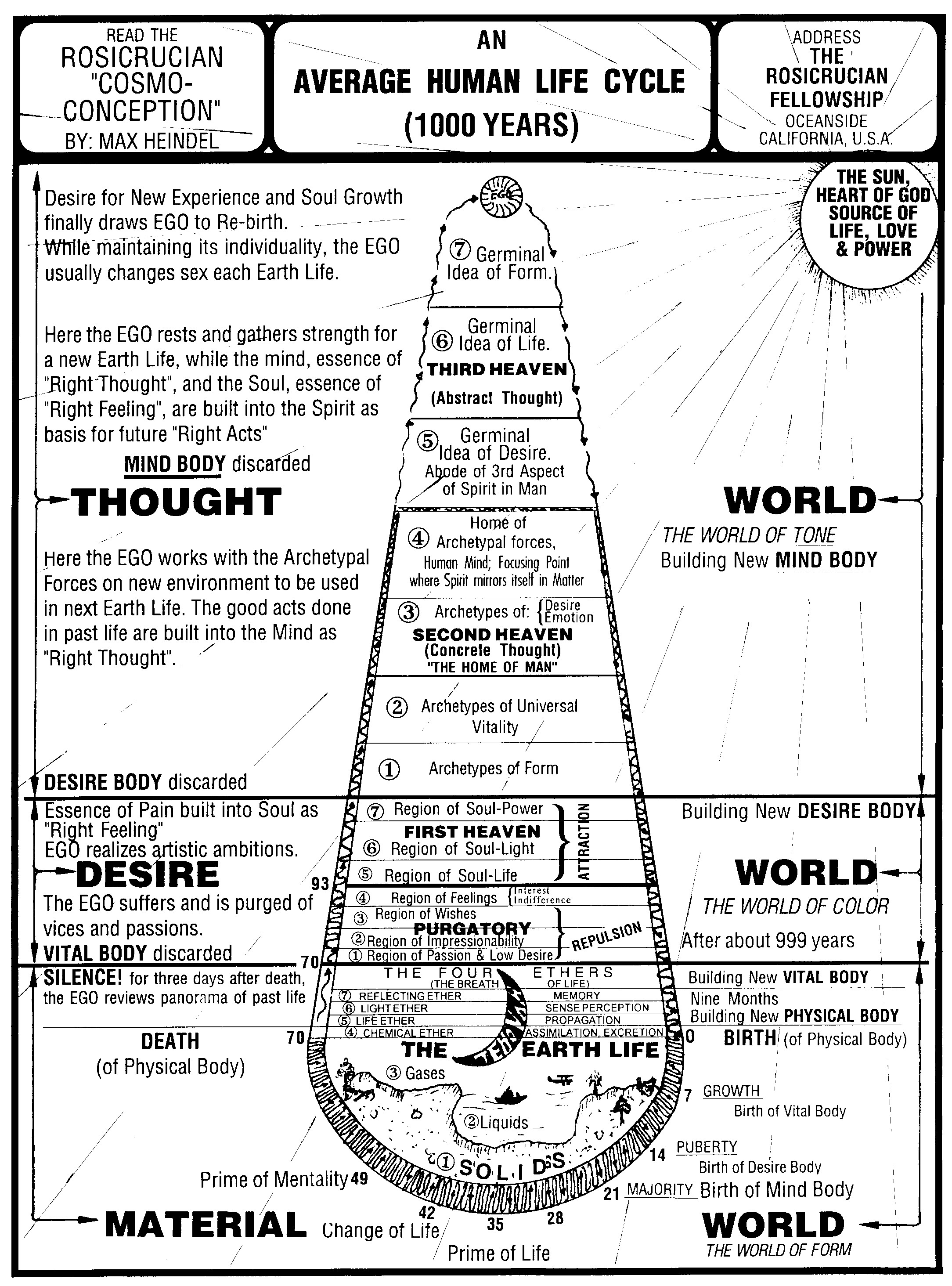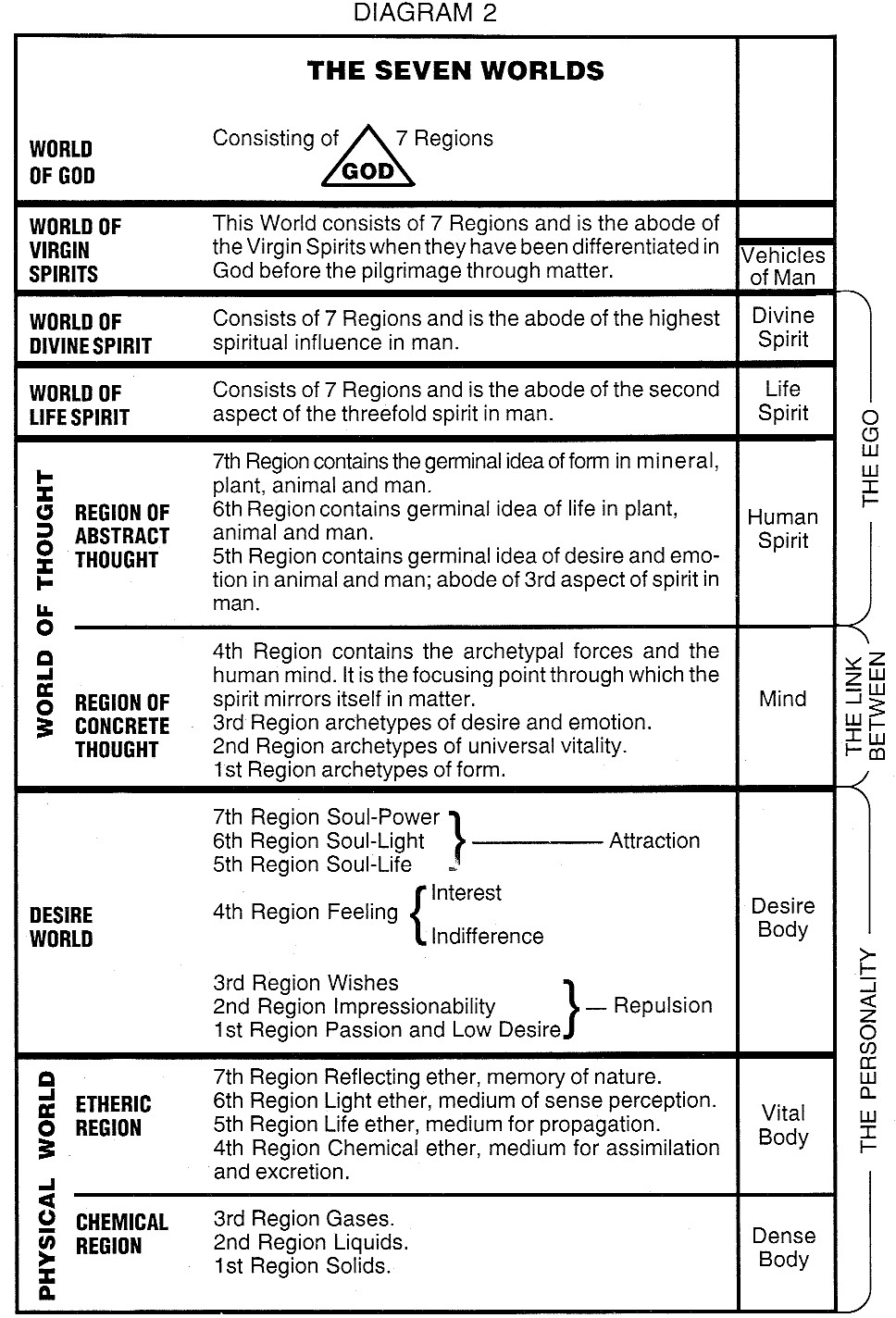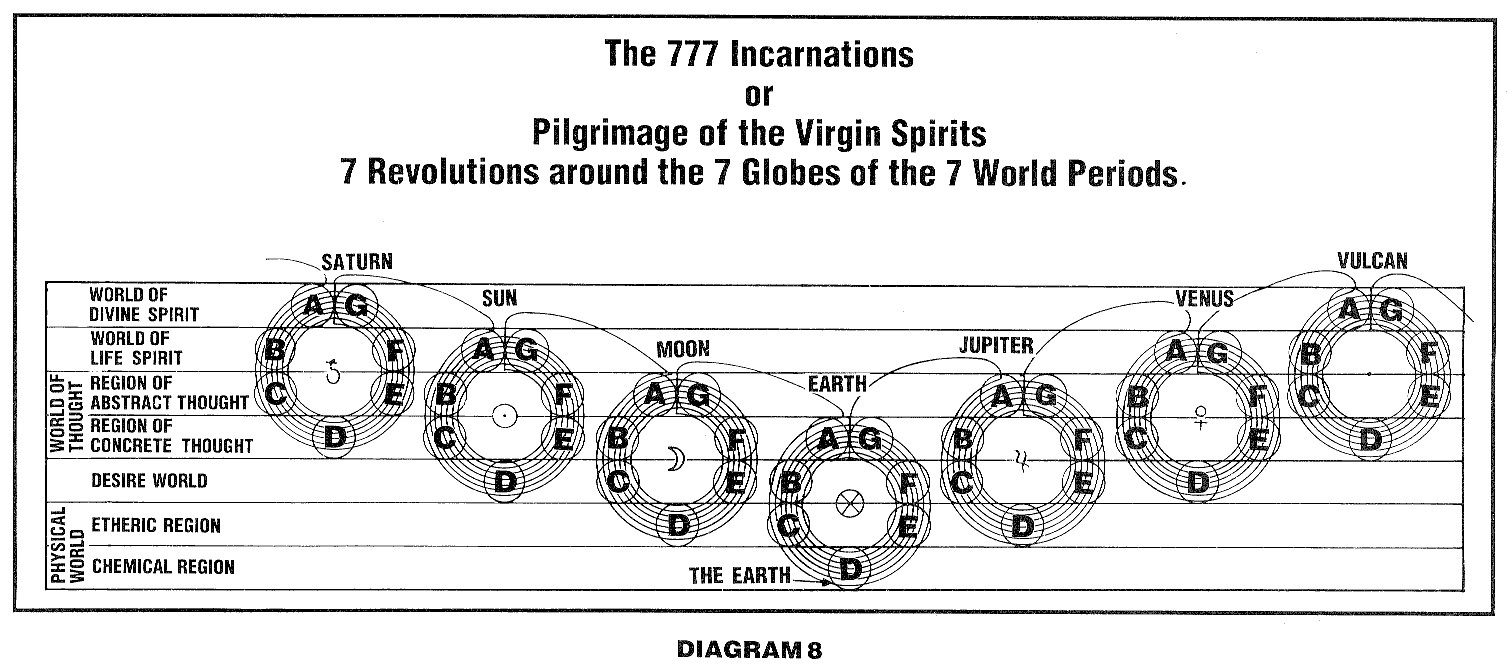
| rosicrucianU.com | ||
| Simplified Scientific Christianity |

Two specific exercises are given to the aspirant on the Western Wisdom Path of Preparation: Retrospection and Concentration. Both lead to a development of spiritual sight and insight; both are necessary to secure a thoroughly rounded development.
The philosophy of the attainment of spiritual sight and insight is to compel the desire body to perform the same work inside the dense body while we are fully awake, positive, and conscious, as it does outside in sleep and in the post-mortem state.
Max Heindel states that: "The evening exercise, retrospection, is of greater efficiency than any other method in advancement." It "is of prime necessity to the intellectual occultist, because it supplies a feeling for truth...and develops power of devotion." He goes on to describe how best to perform this exercise:
"After retiring for the night the body is relaxed. This very important, for when any part of the body is tense, the blood does not circulate unimpeded; part of it is temporarily imprisoned under pressure. As all spiritual development depends upon the blood, the maximum effort to attain soul growth cannot be made when any part of the body is in tension.
"When perfect relaxation has been accomplished, the aspirant to the higher life begins to review the scenes of the day, but he does not start with occurrences of the morning and finish with the events of the evening. He views them in reverse order: first the scenes of the evening, then the events of the afternoon, and lastly the occurrences of the morning. The reason for this is that from the moment of birth when the child draws its first complete breath, the air which is inspired into the lungs carries with it a picture of the outside world, and as the blood courses through the left ventricle of the heart, each scene of life is pictured upon a minute atom located there. Every breath brings with it new pictures, and thus there is engraved upon that little seed atom a record of every scene and act in our whole life from the first breath to the last dying gasp. After death these pictures form the basis of our purgatorial existence. Under the conditions of the spirit world we suffer pangs of conscience so acute that they are unbelievable for every evil deed we have done, and we are thus discouraged from continuing on the path of wrongdoing. The intensity of the joy which we experience on account of our good deeds acts as a goad to spur us on the path of virtue in future lives.
"But in the post-mortem existence this panorama of life is re-enacted in reverse order for the purpose of showing first the effects and then the causes which generated them that the Spirit may learn how the Law of Cause and Effect operates in life. Therefore the aspirant who is under the scientific guidance of the Elder Brothers of the Rosicrucians is taught to perform his or her evening exercise also in reverse order and to judge him- or her- self each day that he or she may escape the purgatorial suffering after death. But let it be understood that no mere perfunctory review of the scenes of the day will avail...It is the feeling of remorse, of deep and sincere sorrow for what we have done, which eradicates the pictures from the seed atom and leaves it stainless...
"He (the aspirant) endeavors to picture to himself each scene as faithfully as possible, seeks to reproduce before his mind's eye all that took place in each pictured scene, with the object of judging his actions, of ascertaining if his words conveyed the meaning he intended or gave a false impression, or if he overstated or understated in relating experiences to others. He reviews his moral attitude in relation to each scene. At meals, did he eat to live, or did he live to eat...? Let him judge himself and blame where blame is due, praise where merited.
"The value of retrospection is enormous, far-reaching beyond imagination. In the first place, we perform the work of restoration of harmony consciously and in a shorter time than the desire body can do during sleep, leaving a larger portion of the night available for outside work than otherwise possible. In the second place, one lives his Purgatory and First Heaven each night, and builds into the Spirit as right feeling the essence of the day's experience. Thus he escapes Purgatory after death and also saves time spent in the First Heaven; and last, but not least, having extracted, day by day, the essence of experiences which make for soul growth, and having built them into the Spirit, he is actually living in an attitude of mind, and developing along lines that would ordinarily have been reserved for future lives."
Now to summarize the benefits of retrospection when practiced at the end of the day as taught: (1) thorough relaxation of the body; (2) increase in power of devotion and feeling for truth; (3) knowledge of how the Law of Cause and Effect operates in life; (4) restoration of harmony in the bodies more quickly than would otherwise be done; (5) a shortening of the time spent in Purgatory and the First Heaven; (6) progress in attitude and development; (7) thought control, which must result from a disciplined effort to retrace the events of the day.
Sometimes people ask if retrospection is necessary when one repents immediately for undesirable words or actions. However, it seems obvious that it would be impossible to reap all the benefits by simply repenting during the day for undesirable deeds, even if one had the time to do so. The fact that one repents immediately for having hurt another, etc., is all in his favor, of course, but how could any sincere aspirant help doing that? Were there no sincere repentance, there would likely be no incentive to real repentance in the evening.
It should also be realized that constant attention to the events of the day can be detrimental rather than helpful. In fact, Max Heindel warned us not to be over-anxious to accomplish, nor to be fearful and worrisome. "When we are too anxious, constantly ruminating over faults and feverishly anxious to eradicate them, when we are ever intent upon our ourselves to see if we are growing then we are in point of fact exactly as the little boy who has planted a seed and daily scratches the soil from the tiny rootlets to see if the seed is growing into a plant. We know that by his ill-advised anxiety the boy frustrates the very object he wishes to attain; and when we are constantly putting ourselves in the limelight and hypercritically reviewing our shortcomings, we are also defeating the end we seek to serve and deferring the consummation of our hopes. The evening exercise gives us all necessary scope for criticism. To keep chiding ourselves throughout the day has the same effect as if someone else were 'picking' at us all the time.
The path of spiritual progress is the path of self-discipline: control of our thoughts, words, feelings, and deeds. Against this the lower self constantly rebels and offers all kinds of excuses to prevent its accomplishment, but the wise aspirant does not heed them. He realizes that the exercise of retrospection requires the use of will, the highest aspect of the Spirit, to control thought and feeling for a definite, sequential period of time. Hence, for this reason, along with all the others mentioned above, its successful performance is a spiritual victory for the Spirit—a victory which gives strength and power to the Higher Self.
"Concentration, the Morning Exercise, is performed in the morning at the very earliest moment after the aspirant awakes. He must not arise to open blinds or perform any other unnecessary act. If the body is comfortable he should at once relax and commence to concentrate. This is very important, as the Spirit has just returned from the Desire World at the moment of waking, and at that time the conscious touch with that world is more easily regained than at any other time of the day.
"If the body is uncomfortable the aspirant may rise to relieve it ere he concentrates, but much of the efficacy of the concentration is lost by the delay.
"During sleep the currents of the desire body flow, and its vortices move and spin with enormous rapidity. But as soon as it enters the dense body its currents and vortices are almost stopped by the dense matter and the nerve currents of the vital body which carry messages to and from the brain. It is the object of this exercise to still the dense body to the same degree of inertia and insensibility as in sleep, although the Spirit within is perfectly awake, alert, and conscious. Thus we make a condition where the sense centers of the desire body can begin to revolve while inside the dense body.
"Concentration is a word that puzzles many and carries meaning to but few, so we will endeavor to make its significance clear. The dictionary gives several definitions, all applicable to our idea. One is to 'draw to a center,' another from chemistry, 'to reduce to extreme purity and strength by removing valueless constituents.' Applied to our problem, one of the above definitions tells us that if we draw our thoughts to a center, a point, we increase their strength on the principle that the power of the Sun's rays are increased when focused to a point by means of a magnifying glass. By eliminating from our mind for the time being all other subjects, our whole thought power is available for use in attaining the object or solving the problem on which we are concentrating.
"People may become so lost in a book that they are oblivious to all else, and the aspirant to spiritual sight must acquire the faculty of be coming equally absorbed in the idea he is concentrating upon, so that he may shut out the world of sense from his consciousness and give his whole attention to the spiritual world. When he learns to do that, he will see the spiritual side of an object idea illuminated by spiritual light, and thus he will obtain a knowledge of the inner nature of things undreamt of by a worldly man.
"When he has reached that point of abstraction the sense centers of the desire body commence to revolve slowly within the dense body, and will thus make a place for themselves. This in time will become more and more defined, and it will require less and less effort to set them going.
"The subject of concentration may be any high and lofty ideal, but should preferably be of such a nature that it takes the aspirant out of the ordinary things of sense, beyond time and space; and there is no better formula than the first five verses of St. John's Gospel. Taking them as subject, sentence by sentence, morning after morning, will in time give the aspirant a wonderful insight into the beginning of our universe and the method of creation—an insight far beyond any book learning. After a time, when the aspirant has learned unwaveringly to hold before him for about five minutes the idea upon which he is concentrating, he may try suddenly to drop the idea and leave a blank. Think nothing else, simply wait to see if anything enters the vacuum. In time the sights and senses of the Desire World will fill the vacant space. After the aspirant has become used to that, he may demand this, that, or the other thing to come before him. It will come and then he may investigate it.
"An ancient legend says that digging for treasure must be done in the stillness of night and in perfect silence; to speak one word until the treasure is safely excavated will inevitably cause it to disappear. That is a mystic parable which has reference to the search for spiritual illumination. If we gossip or recount to others the experiences of our concentration hour we lose them; they can not bear vocal transmission and will fade into nothingness, until by meditation we have extracted from them a full knowledge of the underlying cosmic laws. Then the experience itself will not be recounted, for we shall see that it is but the husk which hid the kernel of worth. The law is of universal value, as will be at once apparent, for it will explain facts in life, teach us how to take advantage of certain conditions and to avoid others. The law may be freely stated at the discoverer's discretion for the benefit of humanity. The experience which revealed the law will then appear in its true light, as of only passing interest and unworthy of further notice. Therefore the aspirant should regard everything that happens during concentration as sacred and should keep it strictly to himself."

|

|

|
|
|
Contemporary Mystic Christianity |
|
|
This web page has been edited and/or excerpted from reference material, has been modified from its original version, and is in conformance with the web host's Members Terms & Conditions. This website is offered to the public by students of The Rosicrucian Teachings, and has no official affiliation with any organization. | Mobile Version | |
|